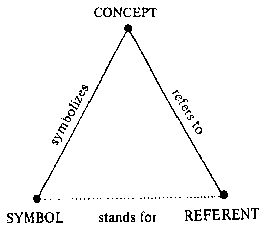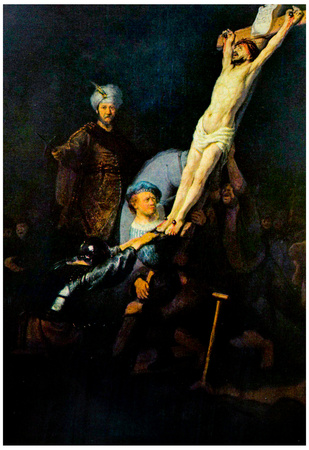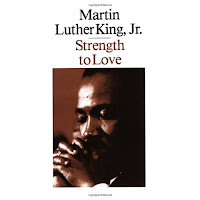A question to consider is: how do you deal with guilt? Perhaps you hurt another person or chose to do something that you knew was wrong and the memory troubles you. Do you try to put guilt out of your mind and ignore the feelings of self condemnation? That doesn't work well.
The existence of God adds to the mix. He is the standard of perfection, making our own limitations for goodness apparent. When we approach the holiness of God we may realize the extent of our own faults and tendency to do wrong as never before.
The reality is that we are alienated from our own best intentions, from others and ultimately from our Creator. Alienation from God is called sin. It is the root of human wrong. We could say that sin has short circuited our hardwiring.
A brief review of human history with all the manifestations of inhumanity makes the pervasiveness of our existential brokenness clear.
A brief review of human history with all the manifestations of inhumanity makes the pervasiveness of our existential brokenness clear.
The guilt we feel is a symptom that the human condition is broken and needs repair.
Is there a way to resolve personal and spiritual guilt? Christ offers a solution to guilt.
Everyone in the western world has seen images of the cross and Christ dying on the cross. We might wonder why the paintings and films showing a man tortured to death on a post could be so meaningful to believers.
Essentially the idea is that Christ took our place on the cross. That is his death stands for our own. The cross of Christ makes possible the destruction of human guilt.
Paul in his letter to followers of Christ in Rome said:
Rembrant helps in Crucifixion
|
"You see, at just the right time, when we were still powerless, Christ died for the ungodly. But God demonstrates his own love for us in this: While we were still sinners, Christ died for us. He was delivered over to death for our sins and was raised to life for our justification.
"Very rarely will anyone die for a righteous man, though for a good man someone might possibly dare to die. But God demonstrates his own love for us in this: While we were still sinners, Christ died for us. ...
"For if, when we were God's enemies, we were reconciled to him through the death of his Son, how much more, having been reconciled, shall we be saved through his life!"
When we contemplate the execution of the Son of God -- the eternal Word of God -- being nailed to death on a wooded post and cross bar the believer will say: "He took my place. Christ died in my stead."
In his painting of the crucifixion, Rembrandt put himself in the scene, helping to hang Jesus on the cross as a reminder that his sins caused the Lord's death.
The imagery goes back to ancient times when the Jewish tribes practiced animal sacrificial rites. Moses taught that certain animals should be offered up to God in spiritual ceremonies. The Hebrew priests of Yahweh would kill goats, bulls, calves or doves, burning the meat and using the blood in purification rituals.
/images/scan0004.jpg) At the annual Day of Atonement the high priest would lay his hands on the heads to two goats, confessing over them the sins of the people that year. One of the goats would be killed, it's blood used in ritual. The other, known as the "scape goat" would be chased into the wilderness, banished from the people.
At the annual Day of Atonement the high priest would lay his hands on the heads to two goats, confessing over them the sins of the people that year. One of the goats would be killed, it's blood used in ritual. The other, known as the "scape goat" would be chased into the wilderness, banished from the people. Paul and other New Testament writers argued that the ancient sacrificial system pointed to the reality of the final sacrifice for sin in the crucifixion of Christ.
Identifying guilt with the sacrificial animal -- then killing the animal -- could be explained as a form of symbolic projection that relieves a person by psychological catharsis. Aristotle believed that tragic plays in which heros died violent deaths had a healing affect on audiences.
The bible seems to say that the death of Christ on the cross was something more than catharsis. It along with the resurrection opened up a new reality analogous to the big bang creation of the universe. Now all things are new. The old life is gone. Absolute meaning is now accessible.
 Remember the Triangle of Meaning. Words stand for things. Symbols represent referents. Just as the sacrificial animal killed in the days of Moses represented the killing of the offenses of the people, so Christ as the Word of God, the universal Logos (meaning behind the universe) has taken our place, blotting out our sin and killing our guilt.
Remember the Triangle of Meaning. Words stand for things. Symbols represent referents. Just as the sacrificial animal killed in the days of Moses represented the killing of the offenses of the people, so Christ as the Word of God, the universal Logos (meaning behind the universe) has taken our place, blotting out our sin and killing our guilt.
We could say that the gospel -- the "good news" about the work of Christ -- is the ultimate message, encompassing all that is best about other human messages. It is the substance, like glue, that binds and give coherence among the chatter and absurdity.
All language is substitutionary. Symbols take the place of objects. Each symbol is "sacrificed" when it gives meaning to a referent in the sense that the word is now limited by the concept of the object (referent).
The Word of God -- the person of Jesus Christ -- steps into our world to give us meaning, purifying us of sin and resolving our guilt. His death and resurrection gives us a new identity. We are free from the burden of past wrong doing.
And amazingly, the cross of Christ has a forward in time effect. Not only are past offenses forgiven, but Christ has promised to save us from any future sin which we may commit.
This promise is called grace and reminds believers that our salvation is independent on our own ability to live a perfect life. Rather we depend on the perfect work of Christ on the cross.
This promise is called grace and reminds believers that our salvation is independent on our own ability to live a perfect life. Rather we depend on the perfect work of Christ on the cross.
Martin Luther King, Jr. summed it up this way:
"I would urge you to give priority to the search for God. Allow his Spirit to permeate your being. To meet the difficulties and challenges of life you will need him. Before the ship of your life reaches its last harbor, there will be long, drawn-out storms, howling and jostling winds, and tempestuous seas that make the heart stand still.
"If you do not have a deep and patient faith in God, you will be powerless to face the delays, disappointments, and vicissitudes that inevitably come. Without God, all of our efforts turn to ashes and our sunrises into darkest nights. Without him, life is a meaningless drama in which the decisive scenes are missing.
"But with him, we are able to rise from tension-packed valleys to the sublime heights of inner peace, and find radiant stars of hope against the nocturnal bosom of life's most depressing nights. "Thou hast created us for thyself, and our heart cannot be quieted till it find repose in thee".
( Martin Luther King, Jr. Strength to Love, "Three dimensions of a complete life." 1968. )
You can be free of guilt by asking God through Christ for foregiveness in a simple prayer.
By becoming a part of a Christian community, called a church, you can get the support you need to more fully experience a life of forgiveness.
Back
By becoming a part of a Christian community, called a church, you can get the support you need to more fully experience a life of forgiveness.
Back
Divinity of Christ 1
Divinity of Christ 2
Divinity of Christ 3
Divinity of Christ 4
Divinity of Christ 5
More Comments on the Creeds to come
Divinity of Christ 2
Divinity of Christ 3
Divinity of Christ 4
Divinity of Christ 5
More Comments on the Creeds to come



"If One died for all, then all died." 2 Cor. 5:14
ReplyDeleteDid we not all die with him simultaneously? And if so, v. 15 unveils a love that redefines human life. Whatever reference we have outside of our association with Christ is no longer relevant.
What do you think?